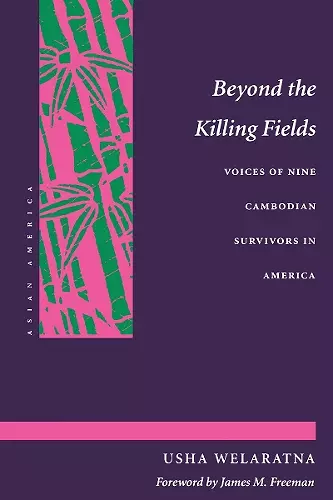Beyond the Killing Fields
Voices of Nine Cambodian Survivors in America
Format:Paperback
Publisher:Stanford University Press
Published:1st Oct '94
Currently unavailable, and unfortunately no date known when it will be back

In 1975, after five years of devastation and upheaval caused by civil war, the Cambodian people welcomed the victorious communist Khmer Rouge led by Pol Pot. Once in power, the new regime tightly closed Cambodia to the outside world. Four years later, when the Vietnamese communists invaded Cambodia and defeated the Khmer Rouge, the world learned that during their control the Khmer Rouge had turned the country into "killing fields," in one of the most horrifying instances of genocide in history. Of an estimated population of 7 million people, about 1.5 million had been killed or had died of starvation, torture, or sickness. After the Vietnamese takeover, thousands of survivors of the Khmer Rouge, fearful of continuing war and a new communist regime, fled their homeland. Approximately 150,000 of them settled in the United States.
This book documents the Cambodian refugee experience through nine powerful first-person narratives of men, women, and children who survived the holocaust and began new lives in America. The narrators come from varied socioeconomic and ethnic backgrounds and include a former Buddhist monk, an unskilled factory worker, and a farm boy, all of whom are ethnic Cambodians; a middle-class Chinese Cambodian housewife and her daughter; and a Vietnamese Cambodian medical student. The refugees first speak of their lives before the Khmer Rouge. We get an intimate view of a distinct way of life that had evolved over 2,000 years as the refugees relate Cambodian views of life, death, rebirth, karma, love, marriage, and family—views deeply imbued with Buddhist concepts.
Next, with sorrow and sometimes anger, they relive their traumatic survival of the Khmer Rouge, reflecting on the deaths of loved ones and the desecration of their culture. Finally, they retrace their hazardous escapes and journeys to the United States and talk candidly about their hopes, dreams, and fears as they continue the difficult adjustment to a new social and cultural environment. To enhance understanding of the narratives, there are introductory chapters on Cambodia's history, culture, society, and religion. The author concludes with a critique of the concepts used by American social workers and researchers to evaluate the adjustment of Cambodian refugees to life in the United States.
"Welaratna's book is a study in human persecution, courage, and survival that reaches well beyond Southeast Asia. . . . Through these stories of the survivors' ordeal and escape, Welaratna patiently explores the cultural, linguistic, and religious challenges Cambodian refugees face in this country and the long-term impact the violence and turmoil will likely have. There are no comparable texts . . . and Welaratna's work is sensitively written and well researched. Recommended for academic, public, and high school libraries."—Library Journal
ISBN: 9780804723725
Dimensions: unknown
Weight: 440g
312 pages